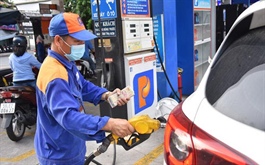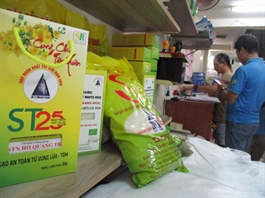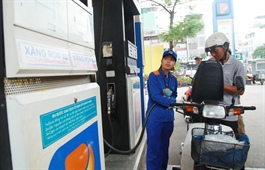Ensuring steady supply of oil and gasoline till the year-end
Ensuring steady supply of oil and gasoline till the year-end
The Ministry of Industry and Trade and other relevant ministries will take measures to ensure the supply of oil and petrol in the last months of 2022 while adjusting the policies to support businesses.

At the press meeting by the MoIT on October 12, Tran Duy Dong, director of the Ministry of Industry and Trade's (MoIT) Domestic Market Department, said that some oil and gasoline retail businesses have recently requested to temporarily suspend operation in localities such as Ho Chi Minh City, An Giang, and Dak Lak.
"Since 2022, the global petroleum market has experienced volatility due to unstable supply and large price swings. These factors have affected the business activities of local oil and petrol companies," he explained.
To make up for a lack of local supplies, fuel wholesalers imported more oil and petrol products in the second quarter. Global fuel prices have reached the highest level since the beginning of the year.
In the third quarter, global fuel prices have slumped, driving down the retail price for gasoline in Vietnam. Many companies reported enormous losses, so they have to scale down their operations and imports. Since then, companies have reduced sales commissions so that retail businesses do not receive the products. As a result, retail businesses are suffering losses, which have forced them to reduce business outputs.
Wholesale businesses do not have a high enough budget to import inventories like previous years due to challenges from credit tightening, rising fuel prices, an increasing USD/VND exchange rate, and difficult access to foreign currency. They mainly maintain a sufficient quantity of goods to supply their distribution system and maintain the inventory reserve according to regulations.
The cost of shipping oil and petrol from abroad to Vietnam has gone up. However, these costs are not fully reflected in the base price of oil and gasoline products sold by the government. Thus, businesses are limiting imports to cut losses. The global market is facing a lack of oil and gasoline supply due to the rising demand from European countries. Small wholesale companies find it hard to access the global supply.
In addition, some wholesale businesses in the south have had their licences revoked for one and one-and-a-half months due to administrative violations. This also contributes to the shortage of supply.
"The MoIT is cooperating with the Ministry of Finance (MoF) to manage oil and gasoline prices in close contact with world oil and gasoline prices in line with domestic petroleum supply and demand movements to ensure harmonisation of interests among stakeholders. This will also encourage businesses to maintain supply while limiting speculation and smuggling of petroleum across the border to neighbouring countries," Dong said.
At the same time, oil refineries need to adjust their production plan to suit the needs of the market while increasing production volume to supply the domestic market.
According to Do Thang Hai, Deputy Minister of Industry and Trade, there are 17,000 oil and petrol retail stores across the country. No matter how many stores are closed, the MoIT and related ministries will take measures to address the problem. Indeed, Vietnam has basically met the supply of petroleum for production, business, and consumption amidst wild fluctuations in the global petroleum market.
Hai also stated that the most important issue is supply. Currently, domestic sources account for 70–80 per cent. The country has to import the remaining 20-30 per cent. However, there are many challenges to sourcing fuel from overseas. Meanwhile, oil and gasoline businesses have suffered losses for a long time, which greatly affects import activities. It would therefore be crucial to remove difficulties for businesses.
"The MoIT will propose to the government to adjust the costs to share with businesses," Hai said.
Supply is expected to remain stable in the last three months of the year. According to the report by Vietnam Oil and Gas Group, two domestic refineries, including Nghi Son and Binh Son, are planned to produce 4.4 million cubic metres, or 80 per cent of the total demand.
The two refineries are operating at maximum capacity. In the fourth quarter of 2022, Binh Son Refinery and Petrochemical JSC is expected to operate at 105 per cent of its Dung Quat oil refinery's capacity. The remaining amount will be imported to ensure supply for the market.

























